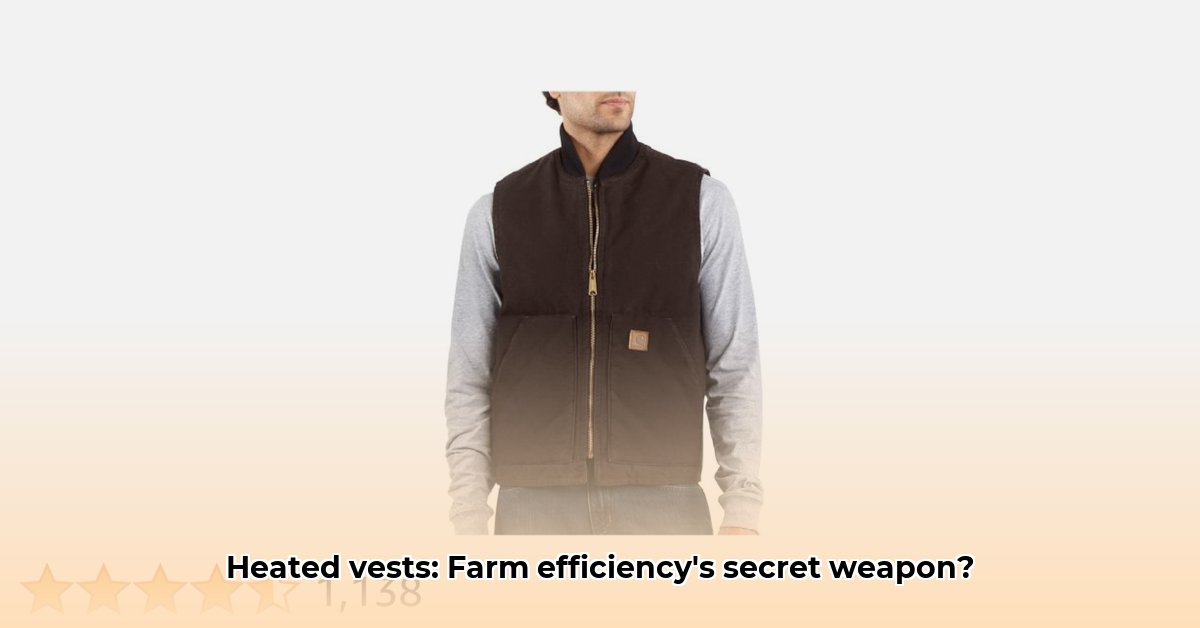
Heated Vests and Sustainable Agriculture: Improving Worker Well-being and Productivity
Working on a farm demands resilience, especially when facing extreme weather conditions. Cold temperatures significantly impact worker comfort, leading to decreased productivity and increased health risks. This article explores how improving worker comfort, potentially through technologies like heated vests available at Tractor Supply, can contribute to a more efficient and sustainable farming operation. For more information on heated vests, check out this resource. We'll examine the crucial role of worker well-being in sustainable agriculture and discuss practical steps farmers can take to enhance both worker comfort and farm sustainability.
The Importance of Worker Comfort in Sustainable Agriculture
Sustainable agriculture prioritizes environmental stewardship and the well-being of those who cultivate our food. A comfortable and healthy workforce is essential for a productive and sustainable farming operation. Exposure to extreme temperatures can lead to decreased productivity, increased injury rates, and higher healthcare costs. Frostbitten fingers hinder precision planting, while shivering hands compromise harvest quality. Prioritizing worker comfort translates directly into improved efficiency and farm profitability. How can farmers best ensure their team can perform at their peak, regardless of the weather?
Exploring Technology and Sustainable Practices
Modern sustainable agriculture leverages technology to optimize resource use and enhance efficiency. Precision agriculture techniques, such as GPS-guided machinery and sensor-based irrigation, contribute to improved yields and reduced environmental impact. But technology's role extends beyond the field itself. Heated vests, for example, represent a practical application of technology to improve worker comfort in challenging environments. This technology minimizes disruptions caused by cold-related issues, improving workflow and overall farm efficiency.
- Enhanced worker productivity: Reduced discomfort leads to longer work hours and improved focus.
- Improved worker retention: Demonstrating care for your workforce fosters loyalty and reduces turnover costs.
- Minimized risk of injury: Preventing cold-related injuries decreases healthcare expenses and downtime.
How Technology Impacts Labor and Sustainability
Technological advancements, including potential solutions like heated vests, directly address the challenges of working in harsh conditions. These technologies can significantly boost productivity by allowing workers to maintain consistent performance despite temperature extremes. However, a thorough cost-benefit analysis, considering factors like initial investment, power source requirements, and maintenance needs, is crucial before widespread adoption. The environmental impact of the technology's lifespan and battery disposal also needs careful consideration. What is the optimal balance between technological investment and environmental responsibility?
Actionable Steps for Farmers
Improving worker comfort and achieving greater sustainability requires a strategic approach. Here are actionable steps farmers can take:
- Assess weather patterns and workload: Identify periods when cold temperatures most significantly impact productivity.
- Research available options: Explore different heated vest models, comparing features, pricing, and user reviews. Prioritize battery life and durability.
- Pilot test a small-scale implementation: Gather feedback from employees before a full-scale adoption.
- Provide comprehensive training: Ensure workers understand proper usage, maintenance, and safety protocols.
- Monitor and adjust: Track productivity, comfort levels, and potential environmental impacts to optimize your strategy.
Conclusion: Prioritizing Worker Well-being for a Sustainable Future
Sustainable agriculture is a holistic endeavor. It involves environmentally conscious practices and a commitment to the well-being of farm workers. Investing in worker comfort, potentially through technologies such as heated vests, is not merely compassionate but also strategically sound. This investment leads to a more productive, healthier, and ultimately, more sustainable farming operation. The long-term benefits – reduced healthcare costs, improved productivity, and enhanced worker retention – often outweigh the initial investment. Remember, a comfortable and healthy workforce is the cornerstone of a successful and sustainable farm.